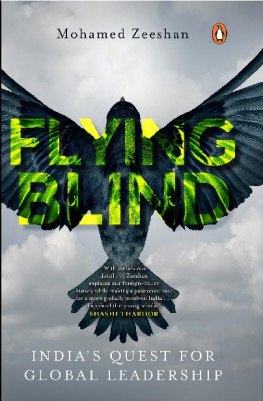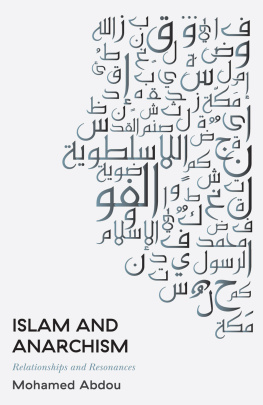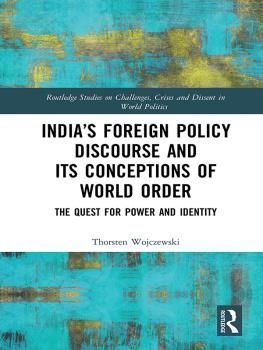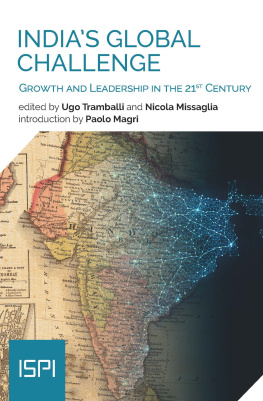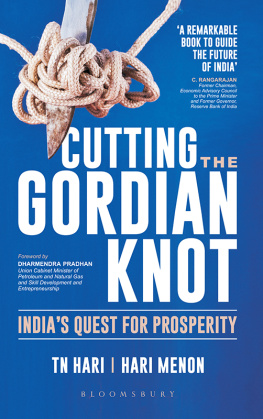MOHAMED ZEESHAN
FLYING
BLIND
Indias Quest For Global Leadership
Contents
Advance Praise For The Book
Tracing the story of Indias foreign policy, from the earliest post-Independence years to the present day, Mohamed Zeeshan writes fluently on one of the great existential questions for any nation: What is our place in the world? With meticulous detail and a wary eye on East and West, Zeeshan explains our foreign-policy history while making a passionate case for a more globally involved India, working to better the complex world it finds itself in. I applaud this young scholar and look forward to the evolution of his future work.Shashi Tharoor, MP
A youthful and starkly unalloyed perspective of Indias foreign policy. Mohamed Zeeshans fresh examination of Indian diplomacys hardy perennials makes for a refreshing read.Syed Akbaruddin, former Indian ambassador to the United Nations
International relations are highly volatile these days, and it is essential for nation-states to craft strategies that enable them to navigate successfully a world order in great flux. This is especially true for emerging powers like India. This timely and important new book, by one of Indias most impressive young thought leaders, lays out a much-needed foreign policy vision for New Delhi.Michael Kugelman, noted South Asia commentator and deputy director of the Asia Program, Wilson Center, Washington DC
Indias foreign policy is at a major crossroads, caught between domestic political temptations and external constraints, faced with the everydayness of an increasingly rebellious and hostile neighbourhood, and having to make far-reaching strategic choices, something the country is not used to. The age of fence-sitting may be over, as also the heart-warming stories of Indias geopolitical rise. Mohamed Zeeshans highly accessible and smartly written book captures the dilemmas of making strategic decisions that will shape Indias foreign policy for a long time to come.Happymon Jacob, professor, Jawaharlal Nehru University, and columnist, The Hindu
In most parts of the world, it is commonly understood that all politics are locally determined. But in the twenty-first century, globalizing, interdependent world, it is crucial for all citizens of nation-states to recognize the importance of their countrys interactions with other countries. Mohamed Zeeshan eloquently and passionately makes the case for understanding foreign policy in the context of Indias economic aspirations.Vishakha N. Desai, senior adviser for global affairs to the president and chair, Committee on Global Thought, Columbia University
To my late grandmother, Khyrunneisa Khader, whose unconditional support and unfailing belief in me I will forever cherish and forever miss
Preface
When I explain to Indian friends that India should start playing a more proactive role in international affairs, they often stop me midway and ask, Why? That is a reasonable question. There will always be a compelling moral case for the worlds largest democracy to help people in faraway lands. But India is still a developing country with several problems back home. Its resources are limited, and should be better spent on domestic problems, rather than on foreign troubles.
Given the complexities of Indias vast and diverse domestic landscape, few Indians spend much time worrying about problems in other parts of the world. When the Indian media covers foreign events, it does so in a rather cursory manner. Foreign policy analysis is almost entirely consumed by the immediate neighbourhoodand generally, just Pakistan. To Indians who reside abroad, this insularity is amply obvious. Just compare a days news coverage in the New York Times to the same days news in any leading Indian English daily. While the Times typically devotes five or six pages to non-US news each day, English dailies in India print a meagre page and a half, at most, of international news.
As India grows in size and significance, this insularity can have costs, both at home and abroad. In the absence of credible ground reporting in foreign countries, the public is forced to speculate wildly about the rest of the world. At its worst, this means dangerous and provocative sensationalism in national discourse, even hate-filled public rhetoric: Many Indians often paint neighbours as existential threats, and leaders have been guilty of chest-thumping at the expense of important allies.
Insularity also means that Indians rarely hold their governments accountable for foreign policy. Lets face it, foreign policy doesnt win you votes. No Indian prime minister has ever won office because of his or her foreign policy acumen, and most political frontrunners in India have had little or no experience with diplomacy or international affairs. When I asked one Indian diplomat what she reckons is the difference between the Indian Foreign Service (IFS) and its more celebrated cousin, the Indian Administrative Service, she simply said, We dont get bothered by politicians.
But this is a problem. Few Indians realize the extent to which they overestimate Indias global influence, or the money spent by the government on essential foreign relations. In 2018, the Pew Global Attitudes survey asked respondents whether India was more important, as important or less important in the world as compared to ten years ago. In only one country did more than 50 per cent of the people say that India was now more important: That country was India. In the other twenty-six countries polled, more than a third said India was no more important in 2018 than in 2008. A further 22 per cent said that India had in fact become less important in world affairs in those ten years. There was something even worse about the results of this poll: The most sceptical about Indias importance were developing countries Brazil, Mexico, Argentina, South Africa, the Philippines, Indonesia and the like.
For a country that routinely talks of itself as a leader of the developing world, these figures should be disturbing. Yet, India spends scant resources on this perception problemor on developing its global influence. To start with, the IFS is woefully understaffed. By some estimates, India has about as many diplomats serving its needs as Singaporea city-state with just over a quarter of the population of Delhi. Indias counterparts in the emerging world fare much better: Brazil, for instance, has over twice as many serving diplomats (with a population roughly the same as the state of Uttar Pradesh). Sometimes, therefore, a single officer must work on such disparate issues as trade and military policy from a single desk, often left with little space to pay sufficient attention to either.
But the question still stands: Why should Indians care about foreign policy? The answer is simple: Indians need their government to be more powerful and influential around the world, in order to be able to fulfil the needs of ordinary Indians both at home and abroad.
At no point in history has the average Indian been as thoroughly globalized as today. Each day, she wakes up to an alarm clock made in China, eats breakfast cereal invented in America, uses a watch designed by the Japanese, and drives a car engineered in Germany, fuelled by oil from the Middle East. In 1960, Indias exports and imports together amounted to less than a tenth of the GDP. By 2014, they weighed up more than four-tenths. In 2016, there were 3,60,000 Indian students in universities overseas, and the year before, almost 16 million Indians were resident abroadthe most for any country that year, according to United Nations data.





